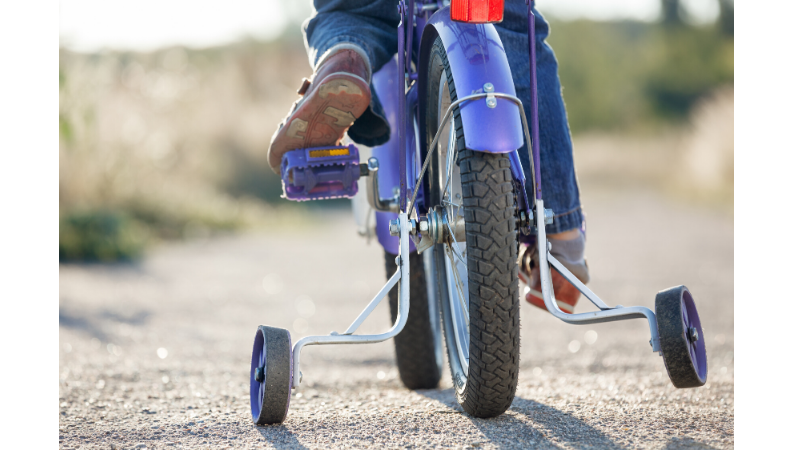When I was learning to ride my bike as a child, the huge moment came the day my Dad took off the training wheels. I would finally get to be like the other big kids! In my kid brain, I thought it would be a simple matter of getting on and doing what I had done so many times before, only like a grown up. Not even close.
It took many falls and skinned knees until the moment of cheating occurred. I would get on, try to pedal and before the other foot could make the circle, the bike would fall over. I became acutely aware of just how much those training wheels had held me up.
My natural reaction to falling over was to try to ride slower and more carefully. It only made things worse. I had not yet discovered the elusive principle that would get me going.
Finally, I had a happy accident. Just as I was about to fall over, I steered opposite the fall and managed to get the pedals to make a full circle before I completely fell over.
The next try, I counter steered intentionally and managed two rotations of the pedals. It was ugly. I rode those few feet as a huge set of S-turns. But I stayed on.
Now I realized I was onto something. The principle of momentum was becoming my friend. With every try, I could go a little further, until I was S-turning down the sidewalk weaving like a drunk sailor. I should have been so happy. I was riding my bike!
Only it felt like cheating. The big kids did not ride like this. The big kids rode in a straight line. The big kids were always balanced. Every time I had to turn the wheel to correct my balance, it felt like something must be wrong with me, like I wasn’t really riding. In my little kid mind, this just felt wrong.
With time, my S-turns became smaller and smaller, until they were no longer turns, but tiny corrections. I could ride in a straight line.
As I grew into an adult, I came to recognize that there was nothing wrong with me or the way I learned. Achieving balance requires that turn of the wheel to make the correction. When I over corrected or under corrected, I either had to compensate or fall over. With time, the corrections become smaller and smaller. They eventually become imperceptible. But they are always there.

It was never cheating. It was part of the process of achieving balance.
In our goal oriented culture, we rarely teach that the turns of the wheel and the corrections towards balance ARE the work. We think those are the mistakes to be avoided on the way to the destination.
Where are you learning something new that needs some big S turns before you have it mastered? Where can you allow yourself space to make the corrections towards balance? What happens to your self talk if you can welcome the mistakes as essential?

